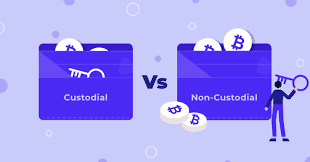In the world of digital currency, keeping your assets safe is a big deal. Custodial vs non-custodial—sounds technical, right? I break it down simply. Think about this: do you want complete control over your crypto, or is ease of use more your thing? Some folks prefer having a third party look after their coins; others keep their digital keys close. The best choice affects your crypto’s safety and how you use your cash. Let’s dive in to find your perfect wallet fit: custodial where you get convenience, or non-custodial where you’re the boss.
Understanding Wallet Types: Custodial and Non-Custodial Options
Evaluating Custodial Wallets: Pros and Cons
Think of custodial wallets like a bank. They keep your crypto safe for you. You trust this service to manage your digital money. Easy, right? But, if they get hacked, your coins might be in trouble.
These wallets are common and simple to use. They are run by third-party custodians. You don’t have to worry about losing your keys. If you forget your password, it’s no big deal. You can reset it.
Yet, there’s a downside. You don’t hold your private keys. Without them, you lack full control. Your access can be cut off. That’s scary for some.
The Non-Custodial Approach: Ownership and Responsibilities
Now, let’s talk about non-custodial wallets. They’re like your personal safe. You hold the keys. No one else.
With non-custodial wallets, you’re the boss. Full wallet control is in your hands. If you want financial sovereignty, this is it.

You must manage your private keys. And never lose them! Write down your seed phrases. Store them where only you can find them.
User privacy stands firm here. You rely on no one but yourself. Decentralized finance shines with non-custodial solutions.
Remember, great power comes with great responsibility. If you mess up, there’s no one to call. The wallet recovery process is all on you.
Choose wisely. Your crypto safety and wallet security depend on it.
Security Measures and Risks in Crypto Wallets
Wallet Security for Custodial Solutions
When you store your crypto in custodial wallets, a third party keeps your digital keys. Think of it like a bank. They manage your crypto funds and security. This means you must trust them to protect your assets. Custodial services take on the heavy lifting of security. But this comes with risks. If the custodian gets hacked, your crypto might be at risk.
Non-Custodial Wallet Security: Private Keys and Seed Phrases
With non-custodial wallets, you’re the boss. You control your private keys and seed phrases. This gives you more power over your digital asset storage. But it also means you’ve got a big job. You must be careful with your keys. If you lose them, there’s no backup. Understanding wallet interfaces here is key. So is knowing your wallet backup options.
Custodial wallets and non-custodial wallets offer different experiences in managing crypto funds. Both have pros and cons. Wallet security is a big deal. A breach can mean losing funds with no way to get them back. You have to weigh wallet types and pick what fits your need for security and control.
In the realm of blockchain security, the debate of custodial versus non-custodial lingers. Custodial solutions give comfort to people new to cryptocurrency management. They handle complex tasks. Yet, this comfort may cost you control over your crypto. With non-custodial wallets, you get more asset ownership. You also get more duties to keep your crypto safe.
So how do you secure your crypto best? Wallet comparison comes in handy here. Let’s break it down. Custodial wallets are like keeping money in a bank. Experts handle the security. You trust third-party custodians. But remember, this can lead to centralization versus decentralization issues. And sometimes, that leads to less financial sovereignty for you.
On the flip side, non-custodial wallets are like having a safe at home. Harder to break into, but you need to handle safety. You keep your private keys. No one else can access your funds unless you let them. This means full wallet control. And in the world of decentralized finance (DeFi), this is big. No one can block your access or manage your assets without your say.
When we talk about wallet security, it is not just about keeping your crypto safe. Offline wallet security matters, too. Hot wallet vs cold wallet is a part of this talk. A hot wallet is connected to the internet. Easy to access, but more open to attack. A cold wallet stays offline. Safer, but trades must move to an online platform first.
In summary, each wallet type has its own set of security measures and risks. Understanding how both kinds work helps you make smarter decisions. Whether you pick custodial services or self-hosted wallets, stay informed. Learn about wallet governance, user privacy, and regulatory compliance. This helps make sure you and your crypto stay as safe as can be.
Managing Your Crypto: Comparing Wallet Control and Accessibility
Exchange Custody Risks vs Self-Hosted Wallet Benefits
When you pick a wallet for your crypto, you face a big choice. Should you trust someone else to hold your coins, or keep them yourself? Custodial wallets are like a bank. A company holds your crypto and you trust them to keep it safe. But if they get hacked, you might lose your funds. And if they close or block your account, you can’t get to your money.
Non-custodial wallets give you control. They let you own your private keys, which are like the secret codes to your money. With these keys, you’re in charge. No one else can touch your crypto without your okay. But remember, if you lose your keys, you can’t get to your money either.
Self-hosted wallets mean taking charge of your financial fate. They stand for freedom in your money matters. But with great power comes great duty. You must protect and backup your wallet so no one else gets in.
Fund Accessibility: Immediate Transactions vs Security Measures
Let’s chat about getting to your crypto when you need it. With custodial wallets, you can move your money fast. It’s right there, online, ready for quick trades and spends. That’s handy when you want to act on a price change or pay for something now.
But here’s the twist – speed can mean less safety. The faster you can get to your money, the faster a hacker might too. That’s why non-custodial wallets add layers of security. It takes more steps, but those steps help keep out thieves. Your crypto sits offline most times in a hardware or paper wallet. Yes, it’s slower to use, but it adds protection.
When we talk about funds in crypto, it’s all about balance. Fast access is great, but don’t skip security. With non-custodial wallets, you wait a bit longer, but you sleep better at night. You know you’re the only one with the key.
Whether you go for a custodial or non-custodial wallet, think it over. Ask yourself how much control you want and how much risk you can handle. Your choice shapes how you use and protect your digital cash. Choose wisely for a crypto journey that fits your life.
Wallet Interfaces and Backup: Enhancing User Experience
Understanding the Ease of Wallet Interfaces
When you pick wallets for your crypto, think of them like phone apps. Some apps take no time to learn, while others need more work. Custodial wallet types often offer easier use. That’s mainly because a third-party takes care of tricky parts like keys and blockchain dealings. Like when a bank handles your cash, custodial services manage your digital coins. They help new users start with crypto by making it less complex.
Non-custodial wallets, on the other hand, require a bit more from you. You’re in charge of your private keys. It’s like the key to a safe where your digital cash live. You need to keep this key secret and secure. If it’s lost, so is access to your funds. Non-custodial options bring control and security but ask for your attention to details.
Both wallet interfaces aim for easy use but carry different needs for learning and managing.
Implementing Wallet Backup Options for Recovery and Safety
Did you know losing your crypto wallet isn’t the end of your digital cash? That’s if you back it up. Crypto management isn’t just about buying and holding. It’s also about staying ready for what-ifs. You need a plan to recover your wallet if your device gets lost or stops working.
Hardware and software wallets support backup through seed phrases. Think of seed phrases like a master key. They bring back your wallet’s contents on a new device. You write down about 12 to 24 words. You then keep these words as safe as your most prized possession. Just as you wouldn’t put all your cash on display, never share your seed phrase.
Custodial wallets can help with backup and recovery in their way. These services might hold onto your backup or help if you forget a password. They add a safety net but also hold onto your wallet’s control.
Non-custodial solutions push for a full do-it-yourself approach. Your seed phrase is your lifeline. With non-custodial wallets, backup is all on you, but so is the control of your assets. It means greater privacy and less risk from third-party mishaps.
Both ways, backing up your wallet is a must for safety. Choose based on how much control and responsibility you want.
Having backups is key to not losing out if something goes wrong with your device. Your careful choice between custodial and non-custodial wallets defines your balance of ease and security. Keep in mind, wallet safety isn’t just about making a smart pick today. It’s a commitment to managing and safeguarding your digital treasures for the days ahead.
In this blog, we looked at crypto wallets, both custodial and non-custodial. We learned custodial wallets are easy but less in your control. Non-custodial wallets put you in charge. Now you know the security steps needed for each type. We saw how having wallets on exchanges affects control and how fast you can trade. User-friendly wallets make a big difference, and so does having a backup plan for safety.
Here’s my final take: Choose a wallet that fits your need for safety and ease. Your choice shapes how you manage your crypto daily. Remember, the right wallet keeps your funds safe and at your fingertips. Stay smart and pick wisely!
Q&A :
What is the difference between custodial and non-custodial services?
Custodial services refer to a situation where a third party holds and manages assets on behalf of an individual or entity, typically involving financial assets like cryptocurrencies or securities. In contrast, non-custodial services empower individuals to keep direct control and management of their assets, without the need for an intermediary.
How do custodial services impact asset security?
Custodial services often employ enhanced security measures to safeguard assets under their care, potentially offering a higher level of protection against hacking or theft. However, they also consolidate risk by holding the assets for many individuals or entities, possibly making them a more attractive target for cyber-attacks.
What control do users have with non-custodial solutions?
With non-custodial solutions, users maintain full control over their assets, including private keys in the context of digital assets. This means they can conduct transactions or make decisions about their assets without needing approval or intervention from a third party.
Are there benefits to using custodial solutions over non-custodial ones?
Custodial solutions can offer benefits such as ease of use, particularly for beginners, assistance with complex functions like trading or asset recovery, and additional features like interest-bearing accounts or loan services. For those willing to sacrifice some control for convenience or those added services, custodial solutions may be preferable.
Can I switch from custodial to non-custodial services, or vice versa?
Yes, it’s possible to transfer assets between custodial and non-custodial services, though the exact process can vary depending on the type of asset and services involved. It’s important to perform due diligence and understand the implications for asset security and control before making such a switch.




